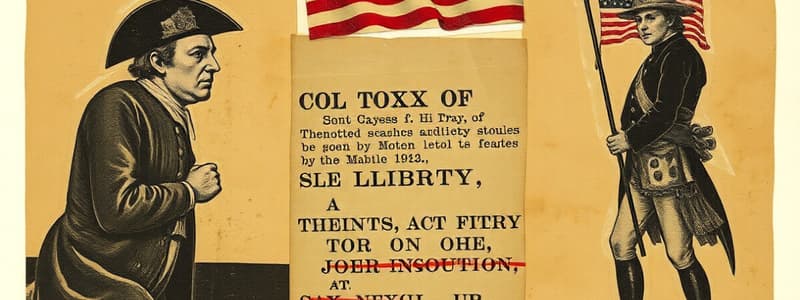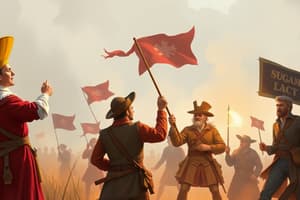Podcast
Questions and Answers
What was the primary reason Britain began imposing new taxes on its North American colonies after 1763?
What was the primary reason Britain began imposing new taxes on its North American colonies after 1763?
- To pay off the substantial debt incurred during the French and Indian War. (correct)
- To discourage further colonial settlement and limit westward expansion.
- To finance the expansion of colonial territories westward.
- To directly fund the lavish lifestyle of the British monarchy.
Which group was founded in Boston by Samuel Adams in response to the Stamp Act?
Which group was founded in Boston by Samuel Adams in response to the Stamp Act?
- The Committees of Correspondence
- The Continental Congress
- The Sons of Liberty (correct)
- The Daughters of Liberty
The colonial rallying cry of 'no taxation without representation' primarily protested which aspect of British policy?
The colonial rallying cry of 'no taxation without representation' primarily protested which aspect of British policy?
- The unfair distribution of tax burdens among the thirteen colonies.
- The use of tax revenue to fund British military presence in the colonies.
- The lack of colonial representation in the British Parliament making decisions about colonial taxation. (correct)
- The excessive amount of taxes being levied on colonial goods.
What was the significance of the Stamp Act Congress in colonial history?
What was the significance of the Stamp Act Congress in colonial history?
What was the immediate outcome of colonial protests against the Stamp Act?
What was the immediate outcome of colonial protests against the Stamp Act?
What was the main declaration of the Declaratory Act passed by the British Parliament?
What was the main declaration of the Declaratory Act passed by the British Parliament?
Which goods were specifically taxed under the Townshend Acts?
Which goods were specifically taxed under the Townshend Acts?
What event directly preceded the Boston Massacre?
What event directly preceded the Boston Massacre?
What was the British justification for taxing the American colonies, as stated in the provided text?
What was the British justification for taxing the American colonies, as stated in the provided text?
Which of the following sequences of events accurately reflects the escalating tensions between Britain and the colonies?
Which of the following sequences of events accurately reflects the escalating tensions between Britain and the colonies?
The Sons of Liberty, led by Sam Adams, utilized the Boston Massacre primarily for what purpose?
The Sons of Liberty, led by Sam Adams, utilized the Boston Massacre primarily for what purpose?
What was the primary objective of the British Parliament in enacting the Intolerable Acts?
What was the primary objective of the British Parliament in enacting the Intolerable Acts?
What is the most historically significant outcome of the battles at Lexington and Concord?
What is the most historically significant outcome of the battles at Lexington and Concord?
What was the initial stance of the Second Continental Congress towards the prospect of independence from Britain?
What was the initial stance of the Second Continental Congress towards the prospect of independence from Britain?
What was the primary impact of Thomas Paine's Common Sense on the American colonies?
What was the primary impact of Thomas Paine's Common Sense on the American colonies?
Which core principle is most prominently asserted in the Declaration of Independence?
Which core principle is most prominently asserted in the Declaration of Independence?
What was the overall contribution of enslaved and free Black people to the American Revolution?
What was the overall contribution of enslaved and free Black people to the American Revolution?
What was the primary role of 'Camp Followers' during the American Revolution?
What was the primary role of 'Camp Followers' during the American Revolution?
What was the main objective of the Daughters of Liberty movement?
What was the main objective of the Daughters of Liberty movement?
What was one significant change in women's roles or rights in the immediate aftermath of the American Revolution, as indicated by the text?
What was one significant change in women's roles or rights in the immediate aftermath of the American Revolution, as indicated by the text?
Which battle is recognized as the final major conflict of the American Revolution?
Which battle is recognized as the final major conflict of the American Revolution?
What was the primary objective of the Continental Navy during the American Revolution?
What was the primary objective of the Continental Navy during the American Revolution?
Which European power's naval fleet played a crucial role in the Siege of Yorktown?
Which European power's naval fleet played a crucial role in the Siege of Yorktown?
What significant outcome of the Battle of Saratoga persuaded France to openly support the American cause?
What significant outcome of the Battle of Saratoga persuaded France to openly support the American cause?
What was the main contribution of Baron von Steuben at Valley Forge during the winter of 1777-1778?
What was the main contribution of Baron von Steuben at Valley Forge during the winter of 1777-1778?
Which of the following best describes the concept of 'Republican Motherhood' that emerged after the American Revolution?
Which of the following best describes the concept of 'Republican Motherhood' that emerged after the American Revolution?
What was the immediate economic state of the newly formed United States following the American Revolution?
What was the immediate economic state of the newly formed United States following the American Revolution?
In what way did the American Revolution impact the institution of slavery in the United States?
In what way did the American Revolution impact the institution of slavery in the United States?
Which of the following actions is attributed to John Paul Jones during the naval operations of the American Revolution?
Which of the following actions is attributed to John Paul Jones during the naval operations of the American Revolution?
What was the significance of the Battle of Trenton in the early stages of the American Revolution?
What was the significance of the Battle of Trenton in the early stages of the American Revolution?
Flashcards
Intolerable Acts (or Coercive Acts)
Intolerable Acts (or Coercive Acts)
British acts enacted in response to the Boston Tea Party, aimed at punishing the Massachusetts Bay Colony.
Boston Tea Party
Boston Tea Party
A major event in which colonists in Boston dumped British tea into the harbor to protest unfair taxation.
Battles of Lexington and Concord
Battles of Lexington and Concord
The first skirmish of the American Revolutionary War, where colonists confronted British forces.
Second Continental Congress
Second Continental Congress
Signup and view all the flashcards
Declaration of Independence
Declaration of Independence
Signup and view all the flashcards
Common Sense
Common Sense
Signup and view all the flashcards
Loyalists
Loyalists
Signup and view all the flashcards
Continental Army
Continental Army
Signup and view all the flashcards
Camp Followers
Camp Followers
Signup and view all the flashcards
Daughters of Liberty
Daughters of Liberty
Signup and view all the flashcards
British Justification for Colonial Taxation
British Justification for Colonial Taxation
Signup and view all the flashcards
Sons of Liberty
Sons of Liberty
Signup and view all the flashcards
British Taxation Acts
British Taxation Acts
Signup and view all the flashcards
Stamp Act
Stamp Act
Signup and view all the flashcards
Stamp Act Congress
Stamp Act Congress
Signup and view all the flashcards
Declaratory Act
Declaratory Act
Signup and view all the flashcards
Townshend Acts
Townshend Acts
Signup and view all the flashcards
Boston Massacre
Boston Massacre
Signup and view all the flashcards
British Justification for Taxation
British Justification for Taxation
Signup and view all the flashcards
Colonial Resistance to British Taxation
Colonial Resistance to British Taxation
Signup and view all the flashcards
What was the Battle of Trenton?
What was the Battle of Trenton?
Signup and view all the flashcards
What was the significance of the Battle of Saratoga?
What was the significance of the Battle of Saratoga?
Signup and view all the flashcards
What was Valley Forge?
What was Valley Forge?
Signup and view all the flashcards
What was the role of the Continental Navy?
What was the role of the Continental Navy?
Signup and view all the flashcards
Who was John Paul Jones?
Who was John Paul Jones?
Signup and view all the flashcards
What pivotal battle led to the end of major fighting in the American Revolution?
What pivotal battle led to the end of major fighting in the American Revolution?
Signup and view all the flashcards
What happened at the Siege of Yorktown?
What happened at the Siege of Yorktown?
Signup and view all the flashcards
What treaty officially ended the American Revolution?
What treaty officially ended the American Revolution?
Signup and view all the flashcards
What was Republican Motherhood?
What was Republican Motherhood?
Signup and view all the flashcards
What were some of the key changes in American society after the Revolution?
What were some of the key changes in American society after the Revolution?
Signup and view all the flashcards
Study Notes
British Debt and Colonial Taxation
- Britain incurred substantial debt following the French and Indian War.
- Britain imposed taxes on the American colonies to alleviate the debt burden.
- This action provoked strong colonial resistance.
Colonial Opposition and the Sons of Liberty
- The Sons of Liberty, founded by Samuel Adams, championed colonial rights.
- Their slogan, "No taxation without representation," encapsulated colonial discontent.
- The group used various forms of protest, including boycotts and more violent acts, against British taxes.
- Examples of these acts included the Stamp Act, the Sugar Act, the Currency Act, and the Quartering Act.
- Colonial protests, including the Stamp Act Congress, highlight the growing discontent and unification.
Escalating Tensions and the Boston Massacre
- The Stamp Act led to the formation of the Sons of Liberty and the Stamp Act Congress.
- The British argued that taxes were necessary for colonial defense and protection.
- The British repealed the Stamp Act but passed the Declaratory Act, asserting British authority to pass laws without colonial consent.
- Subsequent acts, like the Townshend Acts, further fueled colonial resentment.
- The Boston Massacre, a clash between colonists and British troops, served as pivotal propaganda in the fight for independence.
- The Boston Tea Party created a further escalation in the conflict.
Intolerable Acts and the First Continental Congress
- The Intolerable Acts, in response to the Boston Tea Party, were designed to punish Massachusetts.
- These Acts aimed to isolate Massachusetts from other colonies.
- The First Continental Congress was a gathering of colonial representatives to respond to these acts.
- There was an organized boycott of British goods.
Battles of Lexington and Concord
- The Battles of Lexington and Concord marked the opening of the American Revolutionary War.
- Colonists defended against British troops seeking colonial weaponry.
- The engagements demonstrated colonial resolve.
Second Continental Congress
- The Second Continental Congress met after Lexington and Concord.
- The Congress initially sought reconciliation with Britain, issuing the Olive Branch Petition.
- Rejection of the petition led to greater colonial determination for independence.
- Thomas Paine's "Common Sense" advocated for independence as a positive step for American liberty.
- The Congress created the Continental Army and appointed George Washington as its Commander-in-Chief.
Declaration of Independence
- The Declaration of Independence was a formal document asserting colonial independence.
- Crafted by Thomas Jefferson, it was approved on July 4, 1776.
- The Declaration's concept of 'all men are created equal' has had profound and lasting influence.
Roles of African Americans and Women
- African Americans, enslaved and free, participated in the war effort.
- Women supported the war through various means, including nursing and boycotts.
- Figures like Deborah Sampson, Molly Pitcher, and Sybil Ludington exemplify women’s roles in the war.
- The Daughters of Liberty supported the cause through boycotts.
Key Battles and Events
- The Battle of Trenton marked a crucial turning point in the war.
- The Battle of Saratoga further encouraged foreign support for the American cause.
- The Continental Army's winter encampment at Valley Forge presented significant hardships and challenges.
- Baron von Steuben's military training played a vital role in building the Continental Army into a more disciplined force.
- The Battle of Monmouth occurred after the Continental Army's time at Valley Forge.
Naval Operations
- The Continental Navy, largely comprised of privateers, targeted British merchant ships.
- Their actions hampered British efforts and aided the Continental Army.
- John Paul Jones was a prominent naval commander.
- French, Spanish, and Dutch navies also aided the American cause.
Battle of Yorktown
- The Battle of Yorktown was the final major battle of the American Revolutionary War.
- The combined Continental Army and French forces were victorious, leading to British surrender on October 19,1781.
- The siege was crucial in securing American independence.
Post-Revolutionary Society
- The American Revolution dramatically altered the political processes, encouraging more citizens to participate.
- The revolutionary ideals and outcome had mixed effects on different groups of people, such as Native Americans, women, and African Americans.
- Debates about ideals like liberty, equality, and representation were brought forth as a result of the revolutionary war.
Studying That Suits You
Use AI to generate personalized quizzes and flashcards to suit your learning preferences.




